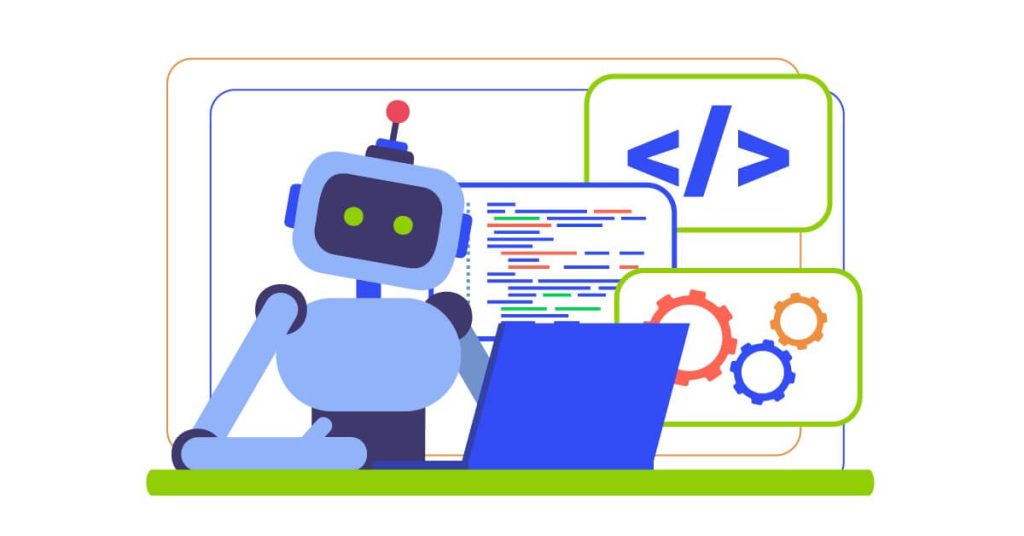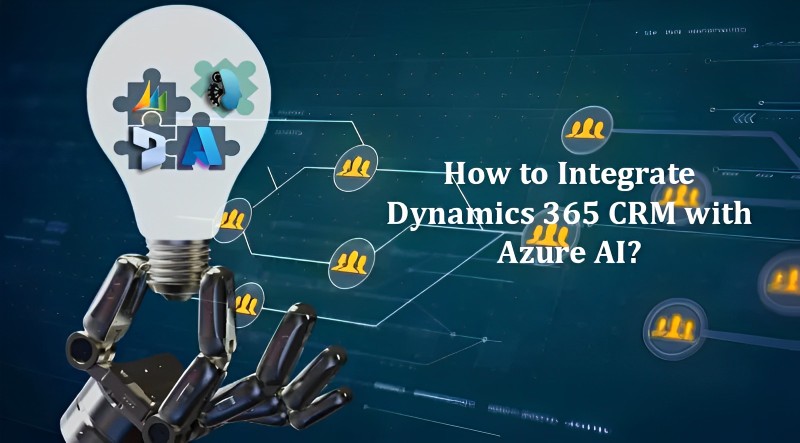
In today’s fast-changing corporate climate, providing excellent client experiences is critical to being competitive.
Dynamics CRM Solutions India is extremely useful for effectively managing customer interactions and relationships.
The Future of AI Automation in CRM Testing
However, as these systems become more complex, it becomes more difficult to maintain their quality.
Artificial intelligence (AI) and automation cutting-edge technologies are poised to alter CRM testing by delivering unparalleled efficiency and accuracy.
Organizations can use AI-driven testing technologies to expedite their testing procedures, improve coverage, and provide dependable CRM solutions that satisfy client expectations.
Let’s look at how AI-powered automation is redefining CRM testing, ushering in a new era of efficiency and efficacy for guaranteeing CRM quality and reliability.
AI Revolutionizes CRM Testing
Traditional CRM testing has often been tedious and time-consuming. Hours spent creating test cases, only to overlook critical scenarios.
Delays caused by execution bottlenecks. And frequent false alarms, reminiscent of a malfunctioning car alarm.
With AI, these challenges can be overcome, ushering in a new era of quality assurance practices.
Intelligent Test Case Generation
With AI’s rapid cognitive capabilities, machine learning models can ingest vast datasets – user stories, requirements documents, production logs, you name it – and automatically generate robust, tailored test cases for your CRM’s unique nuances.
But we’re not talking about mindlessly brute-forcing every conceivable scenario, which would be overkill.
The AI can intelligently identify the highest-risk functional areas that demand rigorous testing based on factors like code complexity, historical defects, customer usage patterns, and more.
Through natural language processing, it can even convert plain English requirements into ready-to-execute test scripts.
It’s like having an automated test concierge preemptively mapping out the most critical checks.
Adaptive Test Execution and Prioritization
Teams under the old testing paradigm walk through preset test sequences, resulting in a boring checklist that is unsuitable for today’s fast product cycles.
AI automation shatters that rigid approach in favor of risk-based, dynamic test prioritization.
Leveraging machine learning algorithms and autonomous software testing tools will strategically determine the ideal test execution order and depth based on real-time code analysis, user analytics, and a constant stream of results feedback.
If a new deployment disables a mission-critical workflow, you can bet those associated test cases will be fast-tracked to the front of the line.
The AI can even automatically adapt and concentrate future test iterations around identified high-risk areas and metrics-driven results from previous runs.
It’s similar to having a shape-shifting test plan that moves itself to provide optimum coverage of your most key CRM features.
No more one-size-fits-all robotic test loops.
Continuous Learning and Improvement
AI testing tools are effectively self-optimizing quality machines, continually improving their detecting capabilities.
With every test cycle and analysis of the results data, the machine learning models enhance their understanding of what constitutes normal or abnormal CRM behaviors.
Over time, they compile these learnings into smarter test profiles, autonomously adapting and fine-tuning themselves as your CRM evolves.
Say goodbye to the days of being burned by some nagging, recurring defect that the static test plan kept overlooking.
With each new release, the AI gains a more comprehensive blueprint of your ideal CRM functioning and can pinpoint even the most obscure deviations.
This inherent continuous improvement loop ensures your quality standards always tighten without any manual test maintenance overhead.
Plus, you gain the confidence that your AI testing armor is staying ahead of the curve rather than regressing into obsolescence.
Integrating AI-Powered Automation into CRM Development Lifecycles

For AI-powered CRM testing to truly transform quality practices, it must seamlessly integrate with modern development methodologies.
These tools can’t operate in a siloed QA environment but need to be core components woven into streamlined delivery pipelines and workflows.
Agile and DevOps Integration
If you’re practicing Agile or DevOps principles like continuous integration/continuous delivery (CI/CD), AI test automation should be a central capability in those rapid iterative cycles.
Instead of quality checks being a monolithic pause-and-wait phase, AI test generation and execution will become asynchronous threads constantly churning behind the scenes in those workflows.
Each incremental CRM code commit or update can automatically trigger an intelligent subset of comprehensive tests without developers ever breaking their flow.
The shorter those automated feedback loops, the faster issues can be identified and remediated before compounding into gaping defects.
That seamless combination of high-velocity development practices and high-fidelity quality checks can put your team on the path toward continuous CRM improvement and true production resilience.
Test Driven Development
Historically, developers have had to invest considerable time manually translating requirements into scripts representing expected behaviors.
By leveraging natural language AI that can directly parse artefacts like Gherkin files and user stories, that burdensome requirement-to-test mapping process can happen automatically.
Developers can articulate intended CRM capabilities in plain language, and autonomous testing agents will distill those into executable assets.
It streamlines collaboration between business stakeholders and technical teams from the outset.
Continuous Monitoring and Proactive Insights
- With AI automation handling the nitty-gritty of test execution, runtime performance data from your production CRM instances can start fueling powerful anomaly detection capabilities.
- Machine learning models can establish comprehensive benchmarks representing your system’s normal operations, and then instantly identify outliers or regressions buried in that sea of metrics and logs.
- These proactive insights create always-on monitoring for CRM quality and resilience.
- Beyond just the initial deployment pipeline, AI can help sustain positive customer experiences by surfacing blind spots before they snowball into widespread issues impacting users.
- Teams can take corrective actions rapidly based on those automated alerts rather than discovering fires through poor user feedback.
- In the AI-powered future, there’s no more crossing fingers and hoping things are working smoothly.
- Continuous testing and monitoring combine into a cohesive quality control fabric.
Addressing Security and Compliance Considerations
Given the high-stakes data involved, security and compliance must be critical considerations for AI-powered CRM testing practices.
These powerful tools require robust guardrails to ensure responsible and ethical usage.
Data Privacy and Secure Data Management
The AI models fueling this advanced Software Testing Services Provider are extremely data-hungry.
- They consume massive amounts of datasets of your CRM production data, application logs, customer records, and more to recognize normal behaviors and map out effective tests.
- This means teams must have strong data governance programs controlling how that sensitive information gets accessed and leveraged.
- This likely involves robust data encryption, techniques for personal identifiers, strict role-based access controls, and comprehensive auditing of data flows.
- Particularly for industries dealing with regulations like GDPR, CCPA, and HIPAA, data privacy and residency must be locked down from end-to-end in the AI testing pipelines.
- Distilling the signal from the noise to train effective AI models is also crucial.
- Teams need robust data labeling and quality control processes to remediate incomplete or outlying information sets that could negatively skew the AI outputs and decision-making.
Ethical AI and Responsible Development
- Aside from technical security problems, the development and implementation of AI-powered testing tools should follow ethical standards and responsible AI practices.
- This includes enhancing transparency in AI model decision-making processes, reducing any biases or discriminatory outcomes, and encouraging accountability and human monitoring.
- Clear policies should be established to prevent situations like models exhibiting discriminatory biases against certain customer demographics or geographies.
- Unexplainable “black box” testing decisions negatively impacting users without recourse, testing optimizations that inadvertently privilege some CRM functions over others based on flawed KPIs, or issues caused by adversarial model attacks or data poisoning.
- These are just some potential hazards that make human oversight, accountability mechanisms, and proactive bias testing so critical.
- Guidelines need to be established for properly sourcing training data, tuning ethical parameters in AI model configurations, baking in transparency requirements, and more.
- Cross-functional teams of developers, QA leads, ethicists, and business stakeholders may need to validate AI outputs before propagating them into production CRM environments.
- There must be a constant human feedback loop monitoring the AI’s rationale and decision-making guardrails.
- Sure, those preventative measures add some due diligence overhead.
- But that mild implementation friction is well worth avoiding potentially brand-tarnishing ethical pitfalls once this tech is fully embedded across customer-facing CRM experiences.
Building Long-Term AI Testing Mastery
Levelling up to robust, AI-powered automation for CRM testing won’t happen overnight.
It requires significant investments of effort, budget, and earnest organizational commitment to make that future a reality.
- Teams will need to construct detailed multi-year roadmaps outlining incremental milestones to conquer from establishing proper data pipelines and governance programs, all the way through full-scale intelligent test automation.
- Designing long-term measurement frameworks with clear KPIs around quality, efficiency, and cost savings will be critical to charting an effective transformation path.
- Developing a workforce with the proper skills and tooling to implement and sustain AI testing at scale is also paramount.
- Organizations may need to consider upskilling programs to cross-train current developers and QA talent with machine learning operations (MLOps), model lifecycle management, and other essential AI competencies.
- Alternatively, they could invest in growing deep AI domain expertise by working with experienced managed service testing providers.
That latter route can fast-track initial deployments but still requires diligent knowledge transfer to eventually assume full autonomy.
Embracing a mindset of constant learning and iteration will be key as well.
As AI automation matures and gets applied to more complex testing use cases, teams will encounter novel implementation challenges.
Dedicated forums for sharing learning and collaborating with the broader QA community will be invaluable for collectively calibrating best practices, libraries, and accelerator tooling.
The most future-proof organizations will treat their AI testing capabilities as perpetually evolving, continuously optimizing for maximum quality and delivery excellence as their CRM tech stacks shift over time.
Making AI Concepts understand easily
Navigating AI’s role in CRM testing might seem like entering a maze. Here, we simplify the journey:
Streamlined Testing Automation
AI handles repetitive tasks, like crafting test cases and ranking their importance. It’s like having a tireless assistant, ensuring tests are thorough and swift.
Smart Test Case Creation
AI’s machine learning chops craft test scenarios using data insights, saving time and covering all bases.
Dynamic Test Prioritization
AI adapts test sequences in real-time, focusing on areas prone to trouble and adjusting as the CRM evolves.
OCR Integration
AI-powered OCR Image to text converter can also extract text from images and documents, automating the conversion of unstructured visual data into usable formats for CRM testing and analysis.
Power
Ever-Improving Learning**: AI isn’t stagnant; it evolves with each test, getting smarter and more effective.
Infusing AI into CRM Development
AI isn’t just for testing; it’s a vital part of the development journey:
Agile and DevOps Harmony
AI seamlessly merges into Agile and DevOps, ensuring testing keeps pace with development strides.
Translating Ideas into Tests
AI translates requirements into actionable scripts, smoothing collaboration between teams.
Vigilant Performance Oversight
AI keeps a watchful eye on CRM performance, spotting anomalies and upholding quality.
Upholding Security and Compliance
AI testing must meet stringent security and ethical standards:
Guarding Data with Care and Ethical AI Practices
AI tools handle sensitive data with utmost security, abiding by strict protocols.
Bias-free and accountable AI models are paramount, with human oversight playing a crucial role.
Nurturing Long-Term AI Testing Excellence
Embarking on the AI testing journey requires a solid plan:
Strategic Roadmap & Skill Cultivation
Milestones guide organizations in implementing AI testing seamlessly.
Developing in-house AI expertise or partnering with managed services providers builds long-term testing proficiency.
As AI evolves, organizations must adapt and embrace ongoing learning to stay ahead.
This emerging intersection of AI, automation, and QA for CRM systems represents a pivotal shift in how we approach testing and quality assurance.
Infusing intelligent models and autonomous systems into traditionally labor-intensive processes holds game-changing potential.
But as with any transformative technological shift, this transition won’t come without hurdles and growing pains.
New competencies must be acquired, challenging ethical implications tackled, and expertise in integrating AI with existing procedures gained.
Are you excited about the benefits AI could unlock for your CRM testing practices? Apprehensive about the significant operational changes required?
However you feel about it, one thing is clear – this future is rapidly going mainstream.
How prepared is your organization to start incorporating AI into the quality framework of your CRM initiatives?
What do you foresee as the biggest impediments or areas of opportunity?
We would love to hear your thoughts and perspectives in the comments!



